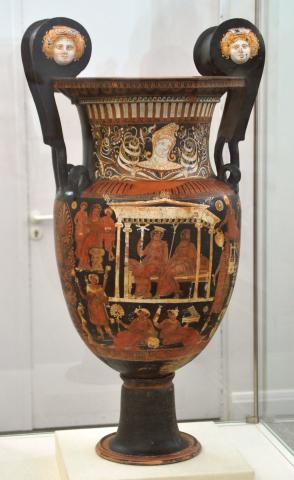Tum gravia mōnstrī colla permulcēns manū
adamante textō vincit. oblītus suī
cūstōs opācī pervigil rēgnī canis
compōnit aurēs timidus et patiēns trahī,810
erumque fassus, ōre summissō obsequēns,
utrumque caudā pulsat anguiferā latus.
postquam est ad ōrās Taenarī ventum, et nitor
percussit oculōs lūcis ignōtae novōs,
resūmit animōs vīctus et vastās furēns815
quassat catēnās; paene victōrem abstulit
prōnumque retrō vēxit et mōvit gradū.
tunc et meās respexit Alcīdēs manūs;
geminīs uterque vīribus tractum canem
īrā furentem et bella temptantem irrita820
intulimus orbī. vīdit ut clārum diem
et pūra nitidī spatia cōnspexit polī,
[oborta nox est, lūmina in terram dedit,]
compressit oculōs et diem invīsum expulit
aciemque retrō flexit atque omnī petīt825
cervīce terram; tum sub Herculeās caput
abscondit umbrās.
— Dēnsa sed laetō venit
clāmōre turba frontibus laurum gerēns,
magnīque meritās Herculis laudēs canit.
Notes
Theseus describes how Hercules led Cerberus up to the surface. He offers an amusing picture of Hercules as a dog walker who almost can’t keep hold of the leash. He also helps his rescuer get Cerberus under control.
807 manū: ablative of instrument (AG 409). Hercules pets the tamed dog.
808 adamante textō: “with braided adamant” (adamant was a semi-mythical very hard substance); this is evidently the same leash as the catenae mentioned below (816). vincit: from vinciō, vincīre (“bind”), not vincō, vincere. oblītus suī: “forgetting himself,” i.e. forgetting his former fierceness, now that Hercules has tamed him.
810 patiēns: “allowing himself,” governs the infinitive trahī.
811 ōre summissō: ablative of manner (AG 412)
813 est … ventum: “we came,” impersonal passive
814 lūcis ignōtae: take with 813 nitor. novōs: “unaccustomed” (LS novus I.B.2). Cerberus had never seen sunlight before.
817 mōvit gradū: “dislodged (him) from his position” (LS gradus II.A)
818 et: = etiam, “also.” meās respexit … manūs: “looked to my hands,” i.e. required my help.
819 geminīs … viribus: ablative of instrument (AG 409); “with the strength of two people.”
820 irā: ablative of manner (AG 412)
821 orbī: “into the world” (i.e., out of the Underworld); dative indicating place to which (AG 428). ut: “as soon as,” with vīdit and conspexit. For temporal ut + perf. indic., see LS ut II.B.1.
823 “Darkness rose over him; he turned his gaze to the ground” (Fitch). Most editors, including Fitch (1987), have deleted this line, which looks like a variation on the idea of 824 that was inserted by a later interpolator.
825–26 omnī … cervice: ablative of instrument (AG 409). Cerberus seeks with all three necks to hide his face on the ground. petīt: = petīvit.
826–27 Cerberus finally finds refuge in Hercules’ huge shadow.
827–29 Theseus ends his account of the journey to the Underworld to welcome the Chorus on stage, who wear laurels “on their brows” (frontibus). laetō … clamōre: ablative of manner (AG 412).
Vocabulary
mōnstrum mōnstrī n.: monster; omen
collum collī n.: neck
permulceō –ēre –mulsī –mulsus or mulctus: to stroke; calm
adamās –antis m.: the hardest iron, adamant; steel
texō texere texuī textus: to weave, braid
vinciō vincīre vīnxī vīnctus: to bind, tie up
oblīvīscor oblīvīscī oblītus sum: to forget
opācus –a –um: shady, dark
pervigil –ilis: ever watchful
timidus –a –um: fearful, afraid
erus –ī m.: an owner, master
submittō submittere submīsī submissus: to place under
obsequor obsequī obsecūtus sum: to obey
cauda –ae f.: the tail, coda
pulsō pulsāre pulsāvī pulsātus: to push, strike
anguifer -a -um: serpent-bearing
ōra –ae f.: shore, coast
Taenarus or Taenaros –ī m. or Taenarum –ī n.: Taenarus
nitor –ōris m.: brightness, lustre
percutiō percutere percussī percussus: to pierce, strike
īgnōtus –a –um: unknown
resūmō –sūmere –sūmpsī –sūmptus: to take up again, resume
vāstus –a –um: empty, desolate; vast
furō furere: to rage, be mad
quassō quassāre quassāvī quassātus: to shake violently
catēna –ae f.: chain, fetter
prōnus –a –um: sloping downwards; prone to
retrō: backwards
Alcīdēs –ae. m.: a descendant of Alceus; Hercules
geminus –a –um: twin, paired
furō furere: to rage, be mad
tentō tentāre tentāvī tentātus: to try
irritus –a –um: invalid, void, vain
pūrus –a –um: clean, unsoiled, pure
nitidus –a –um: shining, bright
cōnspiciō cōnspicere cōnspexī cōnspectus: to catch sight of, behold
polus –ī m.: pole, heavens
oborior –orīrī –ortus sum: to arise, appear
comprimō comprimere compressī compressus: to compress
invīsus –a –um: hated
expellō expellere expulī expulsus: to drive out, propel, expel
retrō: backwards
flectō flectere flēxī flexus: to bend; turn, direct; persuade
cervīx cervīcis f.: neck
Herculeus –a –um: of Hercules; Herculean
abscondō abscondere abscondī or abscondidī absconditus: to put out of sight, hide
dēnsus –a –um: thick; close, compact
laurus –ī f.: laurel
meritus merita meritum: deserved, worthy
Herculēs –is m.: Hercules

